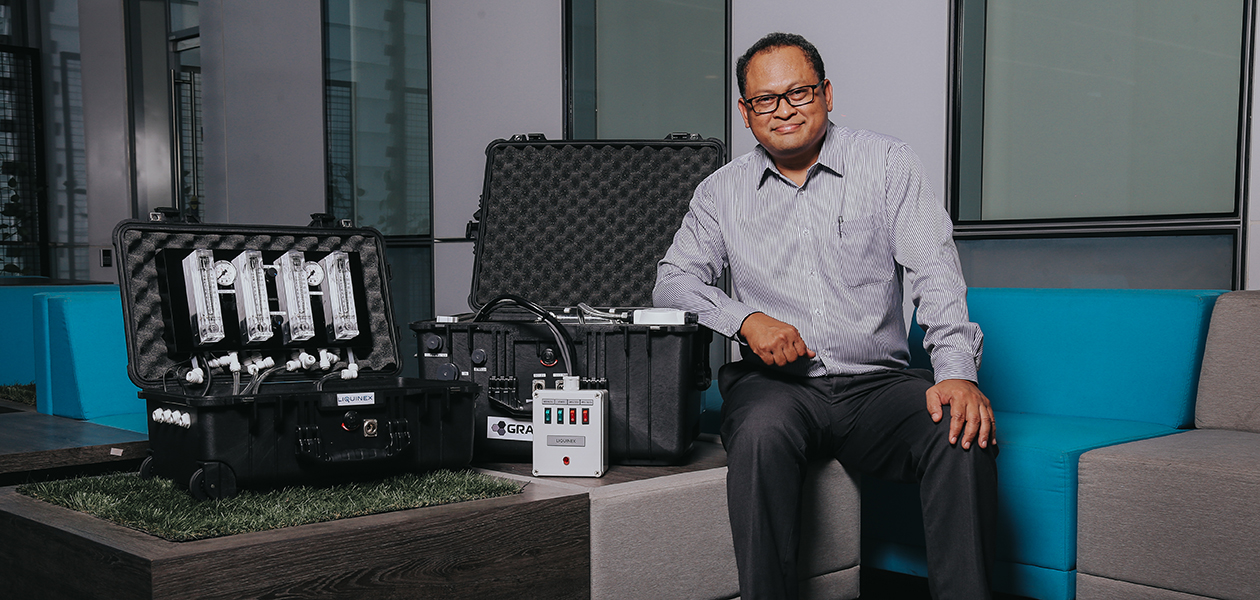Bringing clean water to the masses with open innovation
The sharing and co-development of synergistic water purification techniques will help secure the world's supply of clean, drinkable water, says Bashir Ahmad, CEO of Liquinex Group.
Although nearly 70 percent of the Earth is covered in water, only a small fraction of it is drinkable, and worldwide, some 2.1 billion people lack access to clean drinking water in their homes. Furthermore, with increasing industrialisation and urbanisation, demand for clean water is surging, while pollution of freshwater reserves is becoming prevalent.
Seeking to alleviate the problem of limited access to drinkable water is Bashir Ahmad, CEO and founder of Liquinex Group. A mechanical engineer by training, Bashir is bringing water purification technologies to the rest of the world, beginning with underserved communities in rural parts of Asia and disaster-hit areas such as Kerala, India.
Bashir is no stranger to developing solutions that help communities address their water woes, having worked at the Public Utilities Board and the National Environment Agency of Singapore. In this interview with IPI, he shares how open and active collaboration with companies based in Sweden and Canada is helping his company differentiate its products from the competition.
1. What is the core competency of your company?
Liquinex specialises is the design, fabrication and systems-integration of compact water treatment platforms using next-generation technologies such as ceramic, biomimetic and graphene membranes. Our products also employ sterilising and oxidising components such as ultraviolet (UV) lamps and titanium oxide catalysts.
2. Was there a turning point in your company's history that convinced you that open innovation was the right way to grow?
The turning point came when one of our customers decided to manufacture a similar product to ours. As a fledgling company, we realised that we would not be able to grow or expand if our offerings could be easily replicated by others.
This became strong grounds for pursuing an open innovation strategy, in which we collaborate with compatible technology providers to constantly upgrade our products and strengthen our niche in the water treatment industry.
3. How has open innovation contributed to the building up of Liquinex Group’s competitive advantage?
We were able to offer a superior product with better performance. IPI has contributed to this development by linking us up with like-minded outfits that have state-of-the-art technologies.
For example, we were introduced to Lightlab Sweden at IPI’s TechInnovation event in 2017. We were impressed by their UV disinfection technology in the form of mercury-free UVC tubes. The collaboration has resulted in a compact water purification system the size of a suitcase called H2O-KASE, which can produce up to 500 litres of clean water per hour.
Another key partnership was forged at TechInnovation 2018 with Canadian R&D company Grafoid Inc. Their graphene-based filtration technology is a good complement to our product range.
4. How do you encourage a culture of open innovation in your company?
I always remind my business partners to keep an open mind and adopt a positive, blue-ocean mindset.
5. What are some lessons that you have learnt in the process of engaging in open innovation?
While we do have one registered patent, I'm of the view that it can be counterproductive to be too guarded about our technology or design. As a young company, it is not the right time to focus so heavily on non-disclosures, non-compete documents and patent filings. The cost and process of registering a patent has been a bane rather than a boon, in my experience.
I would rather spend my time and effort gaining exposure and sharing in an open-innovation platform. For instance, in the case of our compact H2O-KASE system, which is meant to serve people in remote areas and places where humanitarian aid is needed, we made it a priority to develop and deliver the system quickly.
We also openly reveal that the performance of our compact filtration system can be regenerated or recovered using common household chemicals, including cola (acidic) drinks. To me, this is effective and acceptable when aspiring towards a greater good—making clean drinking water available to everyone.

